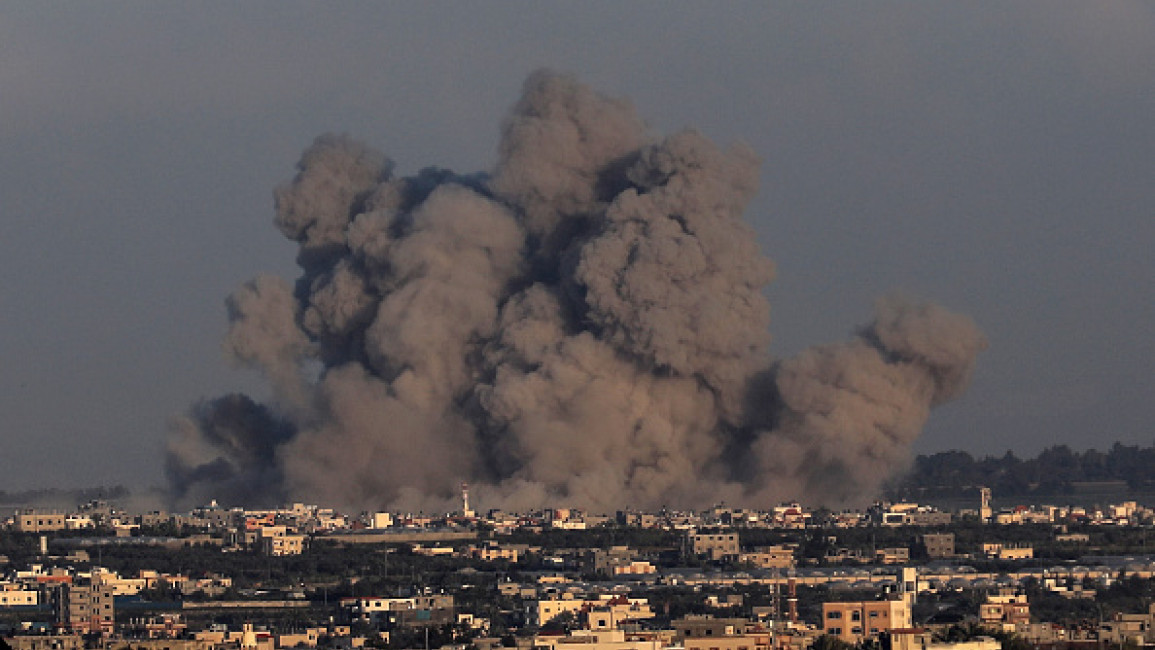
How Israel's war is creating a man-made famine in Gaza

Almost three months into Israel’s brutal onslaught in Gaza, millions are on the brink of famine.
The entire population of the Gaza Strip is now facing acute food insecurity - meaning the livelihoods of 2.2 million people are in immediate danger due to their inability to consume adequate foods, according to IPC ratings, a food security analysis initiative.
Worse, one in four people in Gaza are experiencing what the IPC says are “catastrophic conditions” related to food insecurity: the first of the three indicators of famine.
Given the current, unprecedented levels of acute food insecurity, Gaza will experience famine by early February if the current hostilities and limited aid continue, the initiative predicted.
“The situation, without doubt, is exponentially worse than anything Gaza has previously experienced given the level of destruction, the lack of basic services (including food, water, medicine, shelter and sanitation) and the extreme insecurity people are now experiencing,” Larry Garber, a former senior official for the US Agency for International Development (USAID) for the West Bank-Gaza, told The New Arab.
"Israel is using starvation as a weapon of war, which is a war crime"
For the past two weeks, 26-year-old Asma al-Qassas, her husband, and three young children have been sharing a small tent in a displacement camp in Tel al-Sultan, in Gaza’s southern Rafah governorate.
Asma and her family fled their home in Gaza City at the start of the fighting to a shelter in Khan Younis. However, in early December, when Israel’s ground offensive moved south, they were forced to flee once again.
Asma is one of 1.9 million people, or 85 per cent of Gaza’s total population, who are estimated to have been displaced since Israel’s military response to the deadly Hamas attack on 7 October.
Over one million people, like Asma and her family, are now squeezed into the extremely overcrowded Rafah governorate - left with nowhere else to flee.
“‘Momma I want to eat’,” Asma said her children frequently cry to her, her oldest child just five. She told TNA they are skinny, eating less than half of what they used to before the war. During the past few days, their only meal has been just a half-piece of bread with a small slice of canned luncheon meat on top, she said.
They don’t have cooking gas and can’t afford to buy firewood, so Asma said her husband spends all day searching for wood, or other things to burn, so she can bake bread. Sometimes, Asma said, with such little heat, the bread takes hours to bake - and her children wait until nightfall for their first meal.
"They count down the hours until the bread is ready," she said.
|
|
'Starvation as a weapon of war'
Due to frequent aid stoppages and inspections by Israel, fuel shortages, and ongoing hostilities that have restricted safe movement, the desperately needed food aid to Gaza has only trickled in.
“We can only reach a fraction of the people who need help,” said Reem Nada, a regional communications officer for the World Food Program (WFP) based in Egypt.
Over the first 70 days of the war, only 10 percent of the food needed for Gaza’s entire population entered the enclave, according to the UN’s Office for the Coordination of Humanitarian Affairs (OCHA). Nada told TNA that since 7 October, just over 5,000 trucks have entered Gaza and only half were carrying food. She said this is the number of trucks that would have normally crossed into Gaza within 10 days.
Last week, there was only an average of about 120 trucks entering daily - far below the average of 500 trucks that used to enter each day before the war. In the two weeks since Asma and her family have been living in the Tel al-Sultan tent, she said they have just received two boxes of food aid, with three to four cans of tuna and canned meat, concentrated milk, tea, and a variety of condiments like salsa and ketchup, which she said are “useless”.
"Given the current, unprecedented levels of acute food insecurity, Gaza will experience famine by early February if the current hostilities and limited aid continue"
“In two days it [the food] is gone,” she said. “If we feed ourselves and the children together, of course, it’s not enough.”
A recent statement from Human Rights Watch (HRW) has accused the Israeli government of using starvation as a “weapon of war”.
Omar Shakir, HRW’s Israel and Palestine director, told TNA that the report analysed Israel’s apparent razing of agricultural land, destruction of civilian objects necessary for food production and survival (like bakeries), and statements from Israeli officials that “made clear the deprivation is not accidental”.
“When you put these things together, the conclusion was unmistakable that Israel is using starvation as a weapon of war, which is a war crime,” Shakir said.
Israeli blockade
Even before the war, food aid was entering Gaza at the whims of Israel’s approval. Israel has maintained a 16-year blockade of Gaza, supervising almost all commodities - from electricity and food to medicine - that can exit and enter the enclave. Half of Gaza’s population was already estimated to be facing acute food insecurity before 7 October, the HRW report cited.
Israel’s “total blockade” of Gaza on 9 October resulted in a week-long pause on water and a nearly three-week-long pause on humanitarian aid entering the enclave. Fuel was prevented from entering until 15 November, causing bakeries, hospitals, sewage pumping stations, and water desalination plants to shut down, HRW reported.
While the United States has pressed Israel to allow aid to continue into Gaza at the same levels observed during the ceasefire - which guaranteed about 200 aid trucks to enter daily - the aid is still entering at “grossly insufficient levels”, according to OCHA.
WFP’s Nada reiterated that there are still no imports entering Gaza, meaning the available goods left after nearly three months are extremely limited and are selling at exorbitant prices. This also means that nearly the entire population depends on the trucks of assistance just trickling into the Strip.
However, these trucks loaded with aid cargo are being held up for weeks at the Rafah or Kerem Shalom border crossings with Egypt, due to what Israel says are necessary inspections to prevent the items from being used by Hamas. This inspection process has been described as “cumbersome” and “arbitrary”, and is slowing the aid into Gaza, two US senators said after they visited the border.
|
|
Infectious disease rampant
Sitting beside Asma is her three-year-old son, Zain. While she speaks, his coughs continue steadily. Asma said Zain has had diarrhoea for days. “They tell me to go get medicine for him, but with what money?” she said.
Since 17 December, the number of children with diarrhoea has increased dramatically, with about 3,200 new cases of diarrhoea per day, UNICEF reported last week.
The young mother also said her children are “covered in skin rashes” she believes are from the unsanitary living conditions and lack of clean water. “I wash the same clothes over and over again, but still, everything is dirty,” she described.
The poor sanitation, cramped living conditions, and now colder months have created a breeding ground for infectious diseases, which WFP’s Nada said are spreading rapidly. For the millions suffering from severe hunger, the risk of getting sick is multiplied, with their immune systems too weak to fight off viruses and bacteria, Nada said.
"The longer the conflict continues at the current kinetic levels, the more Gaza will inevitably become uninhabitable for many of the Palestinians there"
Mohamed Salama, a doctor in the neonatal intensive care department at Gaza’s Emirate Crescent Hospital in Rafah, told TNA that he is treating an “alarming” number of cases of intestinal infections daily as a result of contaminated water and other parasites.
He noted a rise in cases of acute gastroenteritis (commonly known as the stomach flu) and rotavirus, an extremely contagious virus commonly caught by children. Both viruses cause vomiting and diarrhoea, which deplete the body of nutrients and fluids and can be deathly for those already suffering from malnutrition.
Salama said he does not have the proper medicines - like multivitamins, nutrient supplements, and oral rehydration solutions - to treat patients with severe cases of these viruses. He said a few infants have passed away in the hospital as a result of their weak immunity due to malnutrition.
The doctor said he also sees many pregnant women who arrive at the hospital showing symptoms of malnutrition, including severe fatigue, numbness in the extremities, loss of hair, and weight loss. Malnutrition during pregnancy can have detrimental effects on the mother and child, he said.
Malnourished pregnant women can be deficient in folic acid (found in foods rich in vitamin B), which can lead to severe birth defects of the baby’s brain and spine, he said. The condition is known as “neural tube defect” and often results in paralysis.
“Our fear is that after this war, we’ll see a lot of babies with these birth defects,” Salama stated. “Please, support us with medicines, food, electricity,” the doctor begged. “So we can help our patients. So we can do our job properly.”
|
|
'Israel has broken every rule in the book'
Asma said that when Zain, her sick son, begins crying from his pain and sickness, she sometimes takes him to a playground at a nearby school to try and lighten his mood. There, they see people selling sweets and Asma says she tells him that “one day, God willing, I will be able to buy you the sweets”.
However, Gaza’s economy has been devastated by the past months of fighting, and it will likely take months more even after hostilities cease to rebuild. The Strip’s farmland - a critical food and export source - has been ravaged by the Israeli war. The Palestinian Central Bureau of Statistics said that Gaza is suffering from at least a $1.6 million daily loss in farm production, as cited in the HRW report.
Israel has waged one of this century’s most destructive wars, destroying nearly 70 per cent of Gaza’s homes and over half of its buildings.
"Poor sanitation, cramped living conditions, and now colder months have created a breeding ground for infectious diseases"
“The longer the conflict continues at the current kinetic levels, the more Gaza will inevitably become uninhabitable for many of the Palestinians there,” said Garber, the former USAID officer.
Israel has broken “every rule in the book” when it comes to humanitarian law, Osama al-Sharif, a Jordanian political analyst, told TNA. “Will there be an investigation into war crimes and crimes against humanity?” he asked. “If this is overlooked, then the whole rules-based international world order means nothing,” he added.
South Africa has launched a case at the UN’s top court alleging that Israel’s military campaign in Gaza amounts to genocide. A few other countries, mostly in South America and the Middle East, have cut ties with Israel due to its actions during the war.
But Israel is still receiving the logistic and diplomatic support of the US, who has continued to veto the desperately called-for humanitarian ceasefire.
For Asma, she said she has stopped watching the news. “Why? No one is looking out for us, no one is coming to help us,” she said.
“The UN are sitting on chairs and giving out roses,” she said angrily. “We don’t want these boxes of stupid food. We want to go back to our homes. We are tired.”
Hanna Davis is a freelance journalist reporting on politics, foreign policy, and humanitarian affairs.
Follow her on Twitter: @hannadavis341
With additional reporting by Noura Kahlout in Rafah, Gaza





